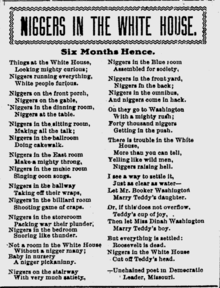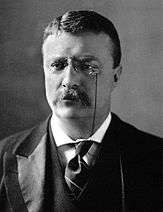Niggers in the White House

"Niggers in the White House" is a poem that was published in newspapers around the United States between 1901 and 1903.[1] The poem was written in reaction to an October 1901 White House dinner hosted by Republican President Theodore Roosevelt, who had invited Booker T. Washington, an African-American presidential adviser, as a guest. The poem reappeared in 1929 after First Lady Lou Hoover, wife of President Herbert Hoover, invited the wife of African-American congressman Oscar De Priest to a tea for congressmens' wives at the White House.[2]
Both visits triggered widespread condemnation by many throughout the United States, particularly throughout the South. Elected representatives in Congress and state legislatures from southern states voiced objections to the presence of an African American as a guest of the First Family.
The poem is composed of fourteen four-line stanzas, in each of which the second and fourth lines rhyme. The poem also frequently uses the titular epithet "nigger" (over 20 times) as a term to represent African Americans. Republican Senator Hiram Bingham of Connecticut described the poem as "indecent, obscene doggerel."[3]
The identity of the author, who used the byline "unchained poet", remains unknown.
History
The poem was written in 1901, appearing in the Missouri Sedalia Sentinel on 25 October.[4] It followed widespread news reports that President Theodore Roosevelt and his family had dinner with African-American presidential adviser Booker T. Washington at the White House on 16 October of that year.[4] Several journalists and politicians condemned Roosevelt's action, claiming, among other things, that such an act made the two men appear equal in terms of social status.[5][6][7] Democratic Senator Benjamin Tillman from South Carolina remarked, "The action of President Roosevelt in entertaining that nigger will necessitate our killing a thousand niggers in the South before they will learn their place again."[6]
The poem was reprinted in the Greenwood Commonwealth in January 1903, after which it circulated in a number of newspapers during 1903, including in The Dispatch on 18 February 1903 and the Kentucky New Era on 10 March 1903. A card-mounted copy of the poem cut from the Sedalia Sentinel forms part of the Theodore Roosevelt papers preserved by the Library of Congress. A typed caption had been added, stating, "Publications like this show something of what is the matter with Missouri."[1]
The poem resurfaced in June 1929 due to a public outcry triggered by another White House invitation. First Lady Lou Hoover, wife of President Herbert Hoover, invited the wife of Oscar DePriest to a tea event.[8] De Priest was a member in the House of Representatives and the only African-American member in Congress in 1929.[9] Mrs. Hoover had a series of teas with the wives of congressmen and Jessie De Priest was among the guests. Southern congressmen and newspapers reacted with public denouncements of the event. Democratic Senator Coleman Blease from South Carolina inserted the poem within a senate resolution entitled, "To request the Chief Executive to respect the White House" in the upper chamber of Congress, which was read aloud on the floor of the United States Senate. However, the resolution, including the poem, was by unanimous agreement excised from the Congressional Record due to protests from Republican senators Walter Edge (from New Jersey) and Hiram Bingham (from Connecticut).[10] Bingham described the poem as "indecent, obscene doggerel" which gave "offense to hundreds of thousands of our fellow citizens and [...] to the Declaration of Independence and our Constitution".[3] Blease withdrew the resolution, but stated he did so "because it gave offense to his friend, Senator Bingham and not because it might give any offense to the Negro race".[3] Scholar David S. Day argues that Blease's use of the poem may have been a populist gesture – "a normal Southern demagogic tactic" – but that Hoover's supporters saw it as something that went beyond even the "broad limits" of partisan political point-scoring.[11]
Composition
The poem is composed of 14 stanzas with four lines per stanza. Every stanza is written in the simple 4-line rhyme scheme (abcb). The term "nigger" is used in all the stanzas of the poem except two.[12]
In Congressman Blease's version of the poem, the last four stanzas were omitted. The last three stanzas mention President Theodore "Teddy" Roosevelt and Booker T. Washington by name and the names of their respective children.[13]
Edward J. Robinson links the poem's comments about racial intermarriage to a "Southern rape complex", according to which racial purity was threatened by the possibility of segregation dispersing in society, and by African-American male interest in Caucasian women.[14]
Excerpt
The final three stanzas of the poem:
I see a way to settle it
Just as clear as water,
Let Mr. Booker Washington
Marry Teddy's daughter.
Or, if this does not overflow
Teddy's cup of joy,
Then let Miss Dinah Washington
Marry Teddy's boy.
But everything is settled,
Roosevelt is dead;
Niggers in the White House
Cut off Teddy's head.[1]
- ^ Cite error: The named reference
Niggers_in_the_White_Housewas invoked but never defined (see the help page).
See also
- A Guest of Honor – the first opera created by Scott Joplin, the celebrated composer of ragtime music. The operatic production was based on the 1901 White House dinner hosted by President Theodore Roosevelt for Booker T. Washington.
- Racism and ethnic discrimination in the United States
References
Newspaper publications
- Missouri newspaper the Sedalia Sentinel on 25 October 1901[4][15]
- Moberly Weekly Monitor on 28 October 1901
- Greenwood Commonwealth, 31 January 1903[14]
- The Tar Heel, 10 February 1903
- The Dispatch, 18 February 1903
- Kentucky New Era, March 13, 1903, p. 6
- The Mt. Sterling Advocate, March 25, 1903
- The Honolulu Evening Bulletin, 13 April 1903 (entitled "Koons in the Kapitol")[16]
Sources
- 1 2 "Niggers in the White House". Theodore Roosevelt Center, Dickinson State University. Retrieved September 12, 2013.
- ↑ Jones, Stephen A.; Freedman, Eric (2011). Presidents and Black America: A Documentary History. Los Angeles: CQ Press. p. 349. ISBN 9781608710089.
- 1 2 3 "Blease Poetry is Expunged from Record". The Afro-American. Baltimore, MD. 22 June 1929. Retrieved 16 September 2013.
- 1 2 3 Edward A. Berlin (1996). King of Ragtime: Scott Joplin and His Era. Oxford University Press. pp. 106–. ISBN 978-0-19-535646-5.
- ↑ Bruce A. Glasrud; Archie P. McDonald (2008). Blacks in East Texas History: Selections from the East Texas Historical Journal; Edited by Bruce A. Glasrud and Archie P. McDonald; Foreword by Cary D. Wintz; with Contributions by Alwyn Barr ... [et Al.]. Texas A&M University Press. pp. 100–. ISBN 978-1-60344-041-7.
- 1 2 Randall Kennedy (18 December 2008). Nigger: The Strange Career of a Troublesome Word. Knopf Doubleday Publishing Group. pp. 8–. ISBN 978-0-307-53891-8.
- ↑ NAACP: Celebrating a Century, 100 years in Pictures. Gibbs Smith. 1 September 2009. pp. 9–. ISBN 978-1-4236-0778-6.
- ↑ "'A Tempest in a Teapot' The Racial Politics of First Lady Lou Hoover's Invitation of Jessie DePriest to a White House Tea". The White House Historical Association. Archived from the original on 5 October 2013. Retrieved 21 September 2013.
- ↑ "De Priest, Oscar Stanton". History, Art & Archives, U.S. House of Representatives. Retrieved 22 September 2013.
- ↑ "Offers 'Nigger' Poem". Evening Tribune. Providence, RI. 18 June 1929. p. 7.
- ↑ David S. Day, "Herbert Hoover and Racial Politics: The DePriest Incident", The Journal of Negro History, 1980, p. 13.
- ↑ "Niggers in the White House". The Dispatch. February 18, 1903. p. 7.
- ↑ "White House Tea Starts Senate Stir". New York Times. June 18, 1929. pp. 38–.
- 1 2 Edward J. Robinson, To Save My Race from Abuse: The Life of Samuel Robert Cassius, University of Alabama Press, Tuscaloosa, 2007, p.183.
- ↑ Ray Argyle (2009). Scott Joplin and the Age of Ragtime. McFarland. pp. 56–. ISBN 978-0-7864-4376-5.
- ↑ Honolulu Evening Bulletin, Vol. XIIL No. 24., p.7.
Further reading
Booker T. Washington incident
- Davis, Deborah (2013). Guest of Honor: Booker T. Washington, Theodore Roosevelt, and the White House Dinner That Shocked a Nation. New York City: Simon and Schuster. ISBN 9781439169827.
- "The Night President Teddy Roosevelt Invited Booker T. Washington to Dinner". The Journal of Blacks in Higher Education. The JBHE Foundation, Inc. 35: 24–25. Spring 2002. JSTOR 3133821.
- Norrell, Robert J. (Spring 2009). "When Teddy Roosevelt Invited Booker T. Washington to Dine at the White House". The Journal of Blacks in Higher Education. The JBHE Foundation, Inc. 63: 70–74. JSTOR 40407606.
- Severn, John K.; William Warren Rogers (January 1976). "Theodore Roosevelt Entertains Booker T. Washington: Florida's Reaction to the White House Dinner". The Florida Historical Quarterly. Florida Historical Society. 54 (3): 306–318. JSTOR 30151288.
- White, Arthur O. (January 1973). "Booker T. Washington's Florida Incident, 1903-1904". The Florida Historical Quarterly. Florida Historical Society. 51 (3): 227–249. JSTOR 30151545.
Jessie De Priest incident
- Day, Davis S. (Winter 1980). "Herbert Hoover and Racial Politics: The De Priest Incident". Journal of Negro History. Association for the Study of African American Life and History, Inc. 65 (1): 6–17. JSTOR 3031544. doi:10.2307/3031544.

